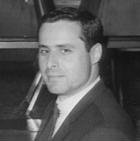Difference between revisions of "Peter Buxtun"
(desc) |
m (reference tidy) |
||
| Line 8: | Line 8: | ||
|death_date= | |death_date= | ||
|death_place= | |death_place= | ||
| − | |description=Blew the whistle on the Tuskegee syphilis experiment. | + | |description=Blew the whistle on the [[Tuskegee syphilis experiment]]. |
|constitutes=researcher, whistleblower | |constitutes=researcher, whistleblower | ||
}} | }} | ||
'''Peter Buxtun''' blew the whistle on the [[Tuskegee syphilis experiment]]. | '''Peter Buxtun''' blew the whistle on the [[Tuskegee syphilis experiment]]. | ||
==Career== | ==Career== | ||
| − | Buxtun, then a 27-year-old [[social worker]] and [[epidemiologist]] in [[San Francisco]],<ref name=heller97> | + | Buxtun, then a 27-year-old [[social worker]] and [[epidemiologist]] in [[San Francisco]],<ref name=heller97>Heller, Jean (July 20, 1997). "The legacy of Tuskegee". St Petersburg Times. p. 1D</ref> was hired by the Public Health Service in December 1965<ref>Rubin, Allen; Babbie, Earl R. (2005). Research Methods for Social Work. Thomson Wadsworth. p. 70. ISBN 978-0-534-62109-4 https://books.google.com/books?id=eAdbEn-yZbcC&pg=PA70&lpg=PA70&dq=%22peter+buxtun%22+syphilis </ref> to interview patients with sexually transmitted diseases; in the course of his duties, he learned of the Tuskegee Experiment from co-workers. He later said—"I didn't want to believe it. This was the Public Health Service. We didn't do things like that."<ref name=heller97/> In November 1966, he filed an official protest on ethical grounds with the Service's Division of Venereal Diseases; this was rejected on the grounds that the Experiment was not yet complete. He filed another protest in November 1968; again, his concerns were ruled irrelevant.<ref>https://web.archive.org/web/20070701074701/http://minority-health.pitt.edu/archive/00000393/01/The_Tuskegee_Syphilis_Study_1932_to.pdf</ref> |
| − | In 1972, Buxtun [[news leak|leaked]] information on the Tuskegee Experiment to [[Jean Heller]] of the ''[[Washington Star]]''. Heller's story exposing the Experiment was published on July 25, 1972; It became front-page news in the [[New York Times]] the following day. Senator Edward Kennedy called Congressional hearings, at which Buxtun and HEW officials testified and the Experiment was terminated shortly thereafter.<ref> | + | In 1972, Buxtun [[news leak|leaked]] information on the Tuskegee Experiment to [[Jean Heller]] of the ''[[Washington Star]]''. Heller's story exposing the Experiment was published on July 25, 1972; It became front-page news in the [[New York Times]] the following day. Senator Edward Kennedy called Congressional hearings, at which Buxtun and HEW officials testified and the Experiment was terminated shortly thereafter.<ref>Stryker, Jeff (13 April 1997). "Tuskegee's long arm still touches a nerve".</ref> Buxtun subsequently testified at the ensuing [[Congressional hearing]]. |
| − | In May 1999, Buxtun attended the launch of a memorial center and public exhibit to the experiment in [[Tuskegee, Alabama|Tuskegee]].<ref> | + | In May 1999, Buxtun attended the launch of a memorial center and public exhibit to the experiment in [[Tuskegee, Alabama|Tuskegee]].<ref>"Center launched as training tool". Associated Press. May 17, 1999</ref> |
{{SMWDocs}} | {{SMWDocs}} | ||
==References== | ==References== | ||
{{reflist}} | {{reflist}} | ||
Latest revision as of 00:18, 5 August 2021
(researcher, whistleblower) | |
|---|---|
 | |
| Born | 1937 Prague |
| Nationality | US |
| Exposed | Tuskegee syphilis experiment |
Blew the whistle on the Tuskegee syphilis experiment. | |
Peter Buxtun blew the whistle on the Tuskegee syphilis experiment.
Career
Buxtun, then a 27-year-old social worker and epidemiologist in San Francisco,[1] was hired by the Public Health Service in December 1965[2] to interview patients with sexually transmitted diseases; in the course of his duties, he learned of the Tuskegee Experiment from co-workers. He later said—"I didn't want to believe it. This was the Public Health Service. We didn't do things like that."[1] In November 1966, he filed an official protest on ethical grounds with the Service's Division of Venereal Diseases; this was rejected on the grounds that the Experiment was not yet complete. He filed another protest in November 1968; again, his concerns were ruled irrelevant.[3]
In 1972, Buxtun leaked information on the Tuskegee Experiment to Jean Heller of the Washington Star. Heller's story exposing the Experiment was published on July 25, 1972; It became front-page news in the New York Times the following day. Senator Edward Kennedy called Congressional hearings, at which Buxtun and HEW officials testified and the Experiment was terminated shortly thereafter.[4] Buxtun subsequently testified at the ensuing Congressional hearing.
In May 1999, Buxtun attended the launch of a memorial center and public exhibit to the experiment in Tuskegee.[5]
References
- ↑ a b Heller, Jean (July 20, 1997). "The legacy of Tuskegee". St Petersburg Times. p. 1D
- ↑ Rubin, Allen; Babbie, Earl R. (2005). Research Methods for Social Work. Thomson Wadsworth. p. 70. ISBN 978-0-534-62109-4 https://books.google.com/books?id=eAdbEn-yZbcC&pg=PA70&lpg=PA70&dq=%22peter+buxtun%22+syphilis
- ↑ https://web.archive.org/web/20070701074701/http://minority-health.pitt.edu/archive/00000393/01/The_Tuskegee_Syphilis_Study_1932_to.pdf
- ↑ Stryker, Jeff (13 April 1997). "Tuskegee's long arm still touches a nerve".
- ↑ "Center launched as training tool". Associated Press. May 17, 1999